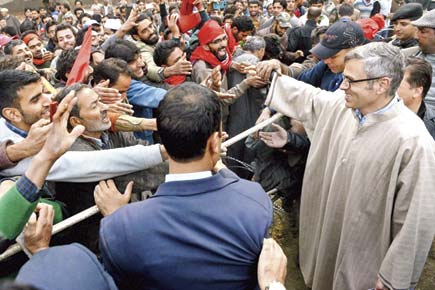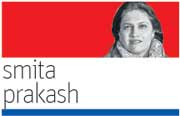In ten days, Kashmir will go to polls. Do you hear the silence? It’s the silence of the old commentariat... those international opinionists who would exude scorn at any kind of democratic process in Jammu and Kashmir because of their own biases

Omar Abdullah
 In ten days, Kashmir will go to polls. Do you hear the silence? It’s the silence of the old commentariat... those international opinionists who would exude scorn at any kind of democratic process in Jammu and Kashmir because of their own biases. There are no crude comments now from the OIC, the EU or from surly American commentators on the right to self-determination of Kashmiris being ignored... at the altar of Indian democracy. Yes, they have said something to that effect in the past. Why, even Pakistani commentators have more or less accepted that assembly elections in J&K are inevitable and more importantly, the people of the state want them.
In ten days, Kashmir will go to polls. Do you hear the silence? It’s the silence of the old commentariat... those international opinionists who would exude scorn at any kind of democratic process in Jammu and Kashmir because of their own biases. There are no crude comments now from the OIC, the EU or from surly American commentators on the right to self-determination of Kashmiris being ignored... at the altar of Indian democracy. Yes, they have said something to that effect in the past. Why, even Pakistani commentators have more or less accepted that assembly elections in J&K are inevitable and more importantly, the people of the state want them.

Jammu and Kashmir Chief Minister Omar Abdullah meeting supporters at an election meeting at Doderhama in Ganderbal distrct on Saturday. Pic/PTI
It has been a rocky journey since the assembly election of 1987, which were rigged. Not that Pakistan has an exemplary record and we all know what happened in Florida in 2000, which determined through doubtful methodology that George Bush would be the president of the US, and not Al Gore. The general elections of 1989 saw less than 10 per cent voting in Kashmir. It was a difficult decade that followed. Thousands lost their lives in a separatist movement. Security forces paid a heavy price too. Both sides have a different set of figures for casualties. Several generations of Kashmiris have been scarred beyond repair.
But since the elections of 2008, there is little doubt that roots of democracy have dug in into the state. It does not mean that separatism does not exist; it does not mean that electricity outages no longer turn into demands for Azaadi. It does not mean that unmarked graves will not remind one of violence and bloodshed. It just means that the people of Kashmir have mostly chosen… to use a cliché, the route of the ballot rather than bullet. The sentence that stays with you long after you watched the Kashmir-based film Haider is: “tumhe koi azaadi nahi mil sakti jab tak tum apne inteqam se azaad nahi ho jaate.” A majority of Kashmiris are waking up to this line of thinking. It isn’t closure to their hurt, regret, trauma or anger. But through peaceful, democratic means, there is a way forward towards conflict resolution.
Azaadi means different things to different people in Kashmir. In Nad Pur Dhallian Tehsil in Nowshera of Rajouri district, the demand is for a pucca bridge over Manawar river, where the makeshift bridge is washed away every monsoon. Parents say children risk their lives getting to school; azaadi for them is safety for their children and a better future. In Mendhar in Poonch which saw heavy cross border firing just a month ago, people talk more about lack of electricity and water supply than about hardcore politics.
The NC-Congress coalition may not have have lived up to the huge expectation that they rode to power on in 2008. But they represented the people of the state, and however imperfect their governance, it was essentially Kashmiri. It was not foisted by New Delhi. Compare this to the Pakistan Occupied Kashmir (PoK), which the Pakistanis call Azad Kashmir. 65 years after being in Pakistani control, they can’t vote. Yes, that’s right. Under the grand illusionary ‘freedom’ that they have, they are not entitled to vote for the federal government of Pakistan. A puppet Minister of Kashmir Affairs appointed by Islamabad represents them, and Gilgit-Baltistan. People in PoK have no political rights the so-called Azad Kashmir government is devoid of all power which is vested in the bureaucracy at Islamabad but you will never hear about this in the Pakistani media. TV channels and newspapers debate endlessly on the rights of Kashmiris in India, but of the Kashmiris who are in Pakistan’s control, you hear nothing.
Nobody speaks about them in the Indian media either. As per the Parliamentary resolution adopted unanimously in 1994, PoK is an integral part of India under illegal occupation by Pakistan and those Kashmiris living there are also Indians. When the state goes to polls now, 24 seats in the assembly will be kept vacant as per Section 48 of the Jammu and Kashmir state constitution for the territorial constituencies that lie in PoK. It is a fact we must never forget.
In the coming days security forces will be under strain to prevent infiltration at the border. They will also have to be extra vigilant against terror groups who will try to intimidate poll officers, politicians and voters from taking part in the democratic exercise. The media will find itself being provoked by friends and foe to tint reports, to suppress information or aid interest groups to impact the elections in the state in one way or the other.
People like former US Assistant Secretary of State Robin Raphel, now under a domestic counter-intelligence probe would probably have termed the election farcical even before it began. Jaundiced views on democracy in Kashmir are now a thing of the past. Here is looking forward to a peaceful election in Jammu and Kashmir where people vote without fear, and in large numbers.
Smita Prakash is Editor, News at Asian News International. You can follow her on twitter @smitaprakash
 Subscribe today by clicking the link and stay updated with the latest news!" Click here!
Subscribe today by clicking the link and stay updated with the latest news!" Click here!







